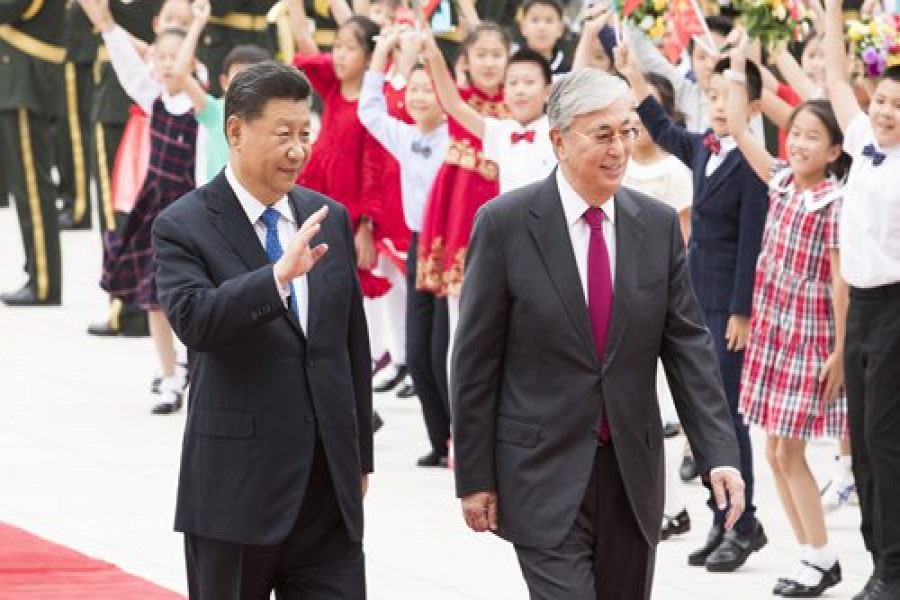
Published :
Updated :

China and Kazakhstan agreed on Wednesday to forge a permanent comprehensive strategic partnership.
The announcement came after Chinese President Xi Jinping and Kazakh President Kassym-Jomart Tokayev met at the Great Hall of the People in Beijing, the Xinhua News Agency reported.
Tokayev is paying a state visit to China from Tuesday to Thursday.
Aside from his meeting with Xi, he will probably also visit Chinese e-commerce giant Alibaba to discuss the possible introduction of the company's business into Kazakhstan, which has drafted a 2019-25 e-commercial development plan aimed at introducing more well-known e-commerce platforms into the country, China News Service reported Tuesday.
China and Kazakhstan could deepen their cooperation in finance, energy, agriculture, transportation, logistics and high-tech under the Belt and Road Initiative to "revitalise the glory of the Silk Road," Tokayev said at the opening ceremony of a meeting of China-Kazakhstan Entrepreneurs Committee (CKEC) on Wednesday in Beijing.
The Central Asia country is interested in expanding agricultural exports to China and serving as a supplier for oilseed crops such as soybeans, Tokayev said. Senior officials also noted at the meeting that the Kazakh government is scaling up efforts to boost its agricultural exports as a key economic growth driver.
China-Kazakhstan ties have set an example for relationships between countries, Tokayev said in a speech on Wednesday morning at the Chinese Academy of Social Sciences.
He stressed that the two countries' friendship is unshakable in the face of global challenges caused by the uneven development and trade war, which, if continues, would lead to a global crisis.
Tokayev's visit will inject new energy to the two sides' cooperation, Zhang Shenfeng, vice chairman of the China Council for the Promotion of International Trade, said at the CKEC meeting .
As a vital member of China-proposed Belt and Road Initiative in Central Asia, trade between China and Kazakhstan reached $19.8 billion in 2018, up 10.4 per cent year-on-year, the Xinhua News Agency reported.
"We want to encourage Chinese companies to open processing plants in Kazakhstan, to buy our raw materials and process here and then transport to China. It's easier and cheaper, and it can lower customs costs," Arystan Kabikenov, deputy governor of the Pavlodar region of Kazakhstan, told the Global Times on a sideline of the CKEC meeting.
Last year, Kazakhstan sold 550,000 tons of wheat to China, and the country aims to boost such exports to 2.0 million tons a year. It also hopes to sell 100,000 tons of edible salt to China every year, officials said at the CKEC meeting.
Officials also said at the meeting that leading Kazakh telecom service provider will cooperate with Chinese tech company Huawei to begin 5G network tests in Kazakhstan by the end of 2019.
In 2018, the Astana International Financial Centre (AIFC) was officially launched in the capital of Kazakhstan (then called Astana), with the Shanghai Stock Exchange holding 25 per cent of its share, according to media reports. The Silk Road Fund is also a shareholder of the financial centre.
Tokayev said the AIFC is developing into an offshore yuan trading centre the first of its kind in Central Asia, and promoting other yuan-related businesses. "The move will help accelerate the yuan's internationalisation."
Chinese experts suggested that since Kazakhstan is advancing the concept of digitalisation, Chinese entrepreneurs should also invest in the country's high-tech industry.
"Facial recognition-based security systems and artificial intelligence-powered medical technologies are the two areas of great potential in Central Asian countries. Chinese firms have a competitive edge in these areas," said Mo Yanping, CEO of China-Eurasia Economic Cooperation Fund at the CKEC meeting.


 For all latest news, follow The Financial Express Google News channel.
For all latest news, follow The Financial Express Google News channel.